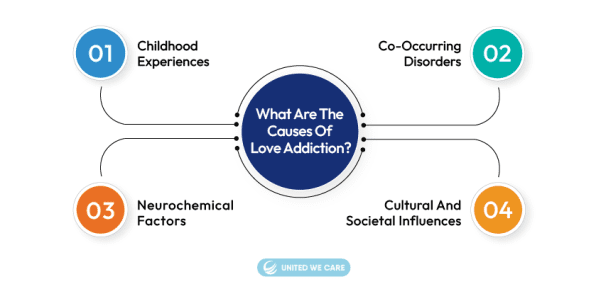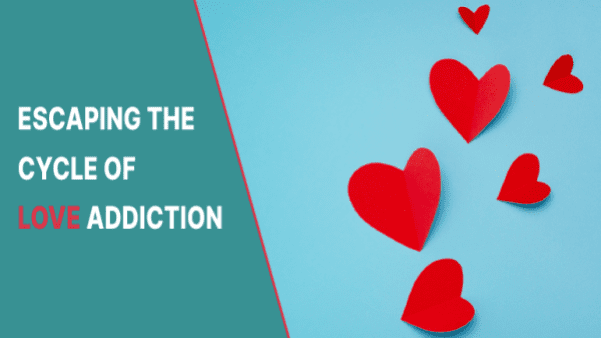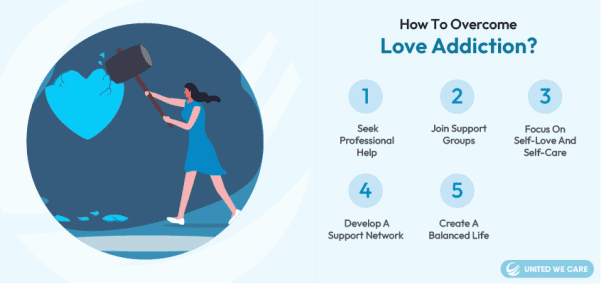Introduction
Love Addiction or Pathological Love is when your romantic relationships utterly consume you. Being in love is one thing, but being consumed by that love that you forget who you really are is another.
There is so much emotional dependence that when you are in a relationship, you are bound to seek validation about yourself and be clingy, creating an unhealthy relationship. This unhealthy relationship and obsession combined can impact mental, emotional, physical, and social disturbances.
“Mature love nourishes; immature love can be lethal. Immature love leads us to love addiction.” – Brenda Schaeffer [1]
What is Love Addiction?
One of the most beautiful feelings and periods of life is when you fall in love with someone. In the movies, you can see this feeling with a light breeze and some instrumental music playing in the background, where the star just keeps staring at the person they fell in love with at first sight.
Remember when Kelly Clarkson sang, “It’s like I can’t breathe, it’s like I can’t see anything, nothing but you… I’m addicted to you”? She was just trying to tell us that this is what love addiction looks like.
When the feelings of love become so heightened that they consume your entire life, it becomes a ‘Love Addiction’ or ‘Pathological Love.’ Such behavior can probably form because you are trying to fill a void or emptiness in your life. As a love addict, you might be heavily dependent on the validation and attention of your partner. Your partner might even call you clingy. You might put your relationships above everything else, even work [2] [3].
This dependence could be emerging out of childhood experiences. When you grow up in an environment where there is a lack of attention and love, you might start idealizing the concept of love and develop a fear of abandonment and loneliness [2]. This fear can impact your self-esteem and overall health [3].
What are the Causes of Love Addiction?
Nobody is born to have the psychological and emotional implications of being a love addict. There are certain reasons that contribute to that [4]:

- Childhood Experiences: Family environment paves a path for how the rest of life is going to turn out to be. If you grew up facing trauma, neglect, and irregular periods of love from your caregivers, then it’s likely that you might end up being addicted to the concept of love. This is also possible if the issues of your childhood are left unresolved.
- Co-occurring Disorders: I’m sure that when you fall ill or feel lonely, you want people around you. Therefore, mental health issues like anxiety and depression can make you want to have a love or attachment with someone who can take care of you.
- Neurochemical Factors: Have you ever wondered how we know that we are in love? Our body and brain tell us that. When we are in love, our brain activates fluids or happy hormones like dopamine and oxytocin. The release of these happy hormones puts us in such a happy zone that we don’t ever want to get out of it. Craving for this feeling obsessively can turn us into love addicts.
- Cultural and Societal Influences: Being a movie fanatic myself, I know how much movies and social media can influence our lives. If you are someone who grew up watching romantic movies with an ideal couple and concepts of love, then you can be someone with a love addiction. Moreover, society pressures us after a certain age to be in a relationship and eventually have a loving family. This pressure can also contribute to love addiction.
What are the Effects of Love Addiction?
While love changes our whole life, love addiction has a deeper impact [5]:
- Emotional Distress: Have you been on a roller-coaster ride? That is what love addiction feels like, with its emotional highs and lows. As a love addict in a relationship, you want confirmation about what you deserve, even your own worth. When your partner is not able to give the validation or fulfill your needs, you might face emotional distress.
- Relationship Dysfunction: Being consumed by the thought of love and being in a relationship, you might not raise your voice even when the relationship turns abusive or toxic. It is also possible that you might go from one abusive relationship to another. Doing so can scar your emotional and mental health for life.
- Impaired Self-Esteem: As a love addict, because you are so dependent on other people’s opinions, you probably won’t value your thoughts about yourself also. It is also possible that not being in a relationship or having relationship issues can make you feel undesirable, drastically impacting your self-esteem.
- Neglected Areas Of Life: Love and romantic relationships can consume your entire life to an extent that you don’t care about your career, hobbies, and life goals. You might not even care about your family or friends. This obsession can bring an imbalance in your life.
What is the Relationship Between Love Addiction and Limerence?
Love addiction and limerence might seem like similar concepts. However, there are a few big differences. Limerence is about being overly attracted to someone. You might have constant thoughts about a particular person when you fantasize about your life together if they decide to reciprocate your feelings. Love addiction, on the other hand, is about being obsessed with the idea of love and being in a relationship. Therefore, if you notice, love addiction is an umbrella term that can include limerence as well. Limerence can add fuel to the fire [6].
Although not all love addicts will experience limerence and vice versa, it is important to understand the relationship so that if you or someone you know show any signs, you know that you would need help.
How to Overcome Love Addiction?
While you might have allowed your whole life to be consumed by the thoughts of love, it is still possible to help yourself [7]:
- Seek Professional Help: When you are finding it difficult to manage your emotions, then doing everything by your own self is not important. Meet an addiction and relationship expert. United We Care is one such platform that you can consider. Such experts can help you understand your emotions and causes in a better manner.
- Join Support Groups: Keep in mind that you are not the only one who is going through love and love addiction-related issues. There are other people out there. Connecting with such people through support groups can be life-changing, specifically if you can see examples in front of you of people who have seen changes in their lives.
- Focus On Self-Love And Self-Care: Please remember one very important thing – your opinion matters, specifically if it’s about you. You don’t need to seek validation from someone else. You are complete and whole in yourself. If you focus on this thought, then it will be easier for you to love yourself and indulge in self-care. Doing so can help you build your sense of self-worth and improve your overall health.
- Develop A Support Network: When we start going toward wrong things, mostly it is our friends and family members who help us come back on the right track. In the case of love addiction as well, you can try asking for support from your friends and family. With their encouragement and guidance, you can overcome any challenges.
- Create A Balanced Life: Since so much of your time has gone into focusing on other people, allow yourself to focus on yourself. Pick up a hobby you like for yourself, or you can even work toward personal or professional goals. This shift in focus can help you break the patterns and create a balanced life.
How to find an Addiction Therapist
Conclusion
Love is an important emotion, but love addiction can impact your entire life. You might be so obsessed with the idea of love and romantic relationships that you may stop focusing on yourself. The reasons for this can be the depiction of movies and how you were shown love as a child. However, it s possible to overcome this obsession and compulsion. Just learn to focus on yourself and what you love doing and understand that you are enough for yourself.
If you are struggling to figure out if it’s love or love addiction, you can connect with expert counselors or explore more content at United We Care! At United We Care, a team of wellness and mental health experts will guide you with the best methods for well-being.
References
[1] “Is It Love or Is It Addiction?,” Goodreads.
[2] A. Gori, S. Russo, and E. Topino, “Love Addiction, Adult Attachment Patterns and Self-Esteem: Testing for Mediation Using Path Analysis,” Journal of Personalized Medicine, vol. 13, no. 2, p. 247, Jan. 2023, doi: 10.3390/jpm13020247.
[3] H. E. Fisher, “The Tyranny of Love,” Behavioral Addictions, pp. 237–265, 2014, doi: 10.1016/b978-0-12-407724-9.00010-0.
[4] “Is It Love or Addiction? Learn the Signs and Causes of ‘Love Addiction,’” Is It Love or Addiction? Learn the Signs and Causes of ’Love Addiction. https://psychcentral.com/blog/what-is-love-addiction
[5] “What Is Love Addiction?,” Verywell Mind, Nov. 29, 2021. https://www.verywellmind.com/what-is-love-addiction-5210864
[6] D. Tennov, Love and Limerence: The Experience of Being in Love. Scarborough House, 1999. doi: 10.1604/9780812862867.
[7] B. D. Earp, O. A. Wudarczyk, B. Foddy, and J. Savulescu, “Addicted to Love: What Is Love Addiction and When Should It Be Treated?,” Philosophy, Psychiatry, & Psychology, vol. 24, no. 1, pp. 77–92, 2017, doi: 10.1353/ppp.2017.0011.












